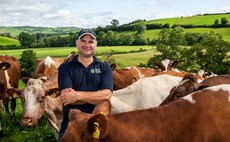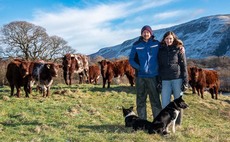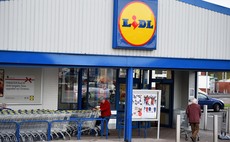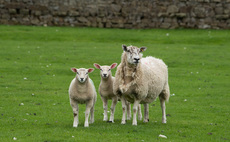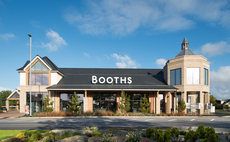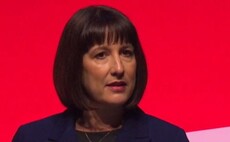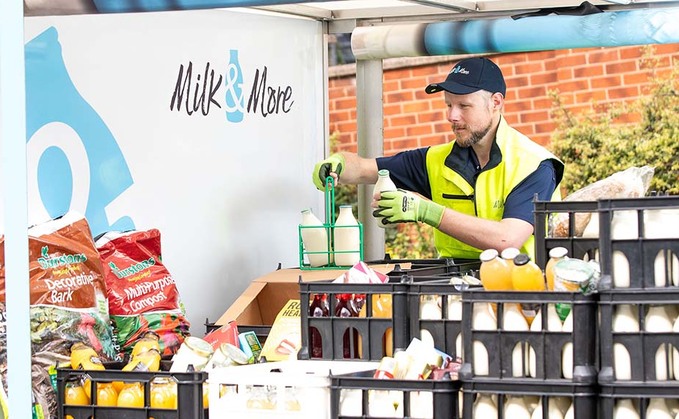
Doorstep milk deliveries have soared in popularity this year as the public look to support local businesses and source their essentials
Lockdown provided a boost for the original home delivery service, the milkman, as the public looked to secure essential items from March.
The milkman has suffered years of decline as a result of competition from retailers, falling from providing around 99 per cent of milk on the doorstep in the 1970s to about 3 per cent pre-Covid 19.
But there was a jump in the number of customers using milkmen during lockdown, up from 527,000 to 716,000, according to data from Kantar.
Looking back to the 1970s, about 99 per cent of milk was purchased on the doorstep through the milkman.
History
AHDB head of market specialists for dairy and livestock Chris Gooderham said: "We start to see milk moving from doorstep to retail and there was a rapid movement through the 1990s. At the start of the 1990s, about 30 per cent of milk was purchased from the retailer. By the end of the 1990s, that was at nearly 75 per cent."
This continued through to the present day. Before the pandemic, about 97 per cent of milk was purchased through retailers.
AHDB
Consumers moving to doing big grocery shops led to a decline in doorstep sales. As sales became less efficient, with fewer people purchasing, prices began to climb further away from supermarket levels.
However, Susie Stannard, AHDB consumer insight manager, said over the lockdown people had looked to reduce how many visits they made to the shops, buying more in a big shop and looking for alternatives.
This had provided a boost for convenience stores, local butchers and delivery schemes such as milkmen.
"To the point at where some of the big milkmen such as Milk and More had to stop taking on new customers because they could not cope with the demand," she said.
She said a lot of people had already been interested in getting milk delivered because they wanted to cut down on plastic use and support local business but the barrier had been price.
Encouragement
"I think what lockdown did was give consumers that extra nudge to think well I am going to do things a bit differently and I am going to get the milkman coming again," she said.
Over The Farmgate Podcast
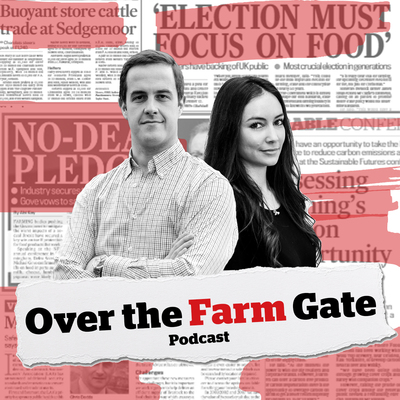
Listen to Over the Farm Gate podcast: The rise of the fastest milkmen in the land now
AHDB 2
Some shoppers had now returned to the supermarket but figures were still much higher than pre-pandemic suggesting dairies were retaining customers.
"The interesting thing is the audience seems to have changed. Traditionally the sort of people who were using milkmen tended to be older, they tended to be more affluent and often retired," she said.
"The new people coming in are more likely to be families with young children and pre-families as well so it really is bringing the milkman to a new audience."
The biggest driver for using a milkman was supporting local business but convenience was also a major factor, allowing people to avoid that extra trip to the shops.
This had also been seen in other sectors, particularly with meat with butchers benefitting.
"They were reporting scenes in their shops which they do not normally see outside of the busy Christmas period," she said, adding farm shops had also done well.
Young families in particular also valued milkmen bringing other staples such as bread, eggs and cheese.
While people were not yet confident in returning to pre-pandemic habits, Ms Stannard highlighted economics would start to influence buying behaviour in the coming months as the furlough scheme ended and redundancies rose.
"Overall I think we would expect to see a boost in customer volumes but we will just have to wait and see to what extent those are maintained.
"But as with anything it is really important that milkmen continue to evolve their offer, continue to innovate and listen to their customers and offer those products which their customers are interested in."
Record sales for Milk and More
Record levels of new online customers signed up to Muller's Milk and More service over the lockdown period with 85,000 signing up between January and August.
During the height of the pandemic, sales of products more than tripled, with website visits up 300 per cent. Between March and August, over 78 million pints of milk were delivered across England.
Sales of bread, yoghurts, eggs, organic fruit and veg and cheese were also ‘unprecedented' with Milk and More recruiting an additional 150 delivery drivers to meet demand.
Their suppliers had also had to adapt as they lost food service revenue but faced a spike in demand from retail.
Milk and More had changed payment terms to weekly to help suppliers meet demand and change packaging and production.
Chris Slocombe, operations director from Longman's, who supply butter and cheese to Milk and More had had to adapt to this change in demand.
"Originally 60 per cent of our sales came from wholesale and foodservice, whilst 40 per cent came from retail.
"Suddenly, we became 90 per cent retail and 10 per cent foodservice, which meant we had to completely swing our packing line from large blocks of cheddar that pubs and restaurants used, to smaller 400g blocks of cheddar, which were more suited for people to use at home."
Case study: Roan's Dairy
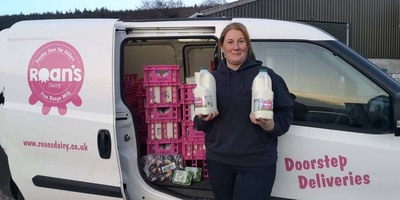
Scottish dairy business Roan's Dairy saw an instant boom when lockdown hit in March.
Sixth generation dairy farmer Aylett Roan said the family had been focusing on what was happening with their children and schooling and on-farm as they went into lockdown themselves and had little time to think about the business.
"The next day, everyone was phoning. I was like ‘okay, let us just keep saying yes and do this and we will need to make it work'," she said.
"So our five-year expansion plan happened within a month which is quite difficult to implement, especially when everyone else is on lockdown."
About five years ago, the family decided they wanted to add value to their milk price. They set up Roan's Dairy and now process their own milk and deliver to doorsteps in Dumfries and Galloway.
They initially planned to deliver to trade customers but found there was a lot of competition on price. As they were looking to boost their milk price, they instead looked at doorstep deliveries.
The dairy went above and beyond for its customers during lockdown.
Ms Roan says: "As a business we say if you are not having milk delivered you cannot have any other products delivered, because our milk is what our business is about. But over lockdown we made exemptions for this, mainly because a lot of the older generation are not able to get out and about."
The dairy also delivers local yoghurts, fresh orange juice, free-range eggs and over lockdown introduced potatoes and toilet rolls.
Some customers had now returned to their normal shopping habits, but Ms Roan said she understood people were creatures of habit.
"Other people have then found it was not sustainable as it is slightly more expensive than milk you would be paying for in the supermarket or in your corner shop," she said.
"But we have a huge amount of customers who are loyal and have found the service works for them. They can have other products along with it and they have just integrated it into their lifestyles."
Ms Roan adds she thinks no-one really knows what to expect going forward but they would be there for people if lockdown happened again.
They currently buy-in glass bottled milk for those who want it, but are putting in a glass bottling plant as customers are looking for environmentally friendly products.
She says: "Hopefully by the turn of the year, they will have a local, free-range milk in a glass bottle available."












